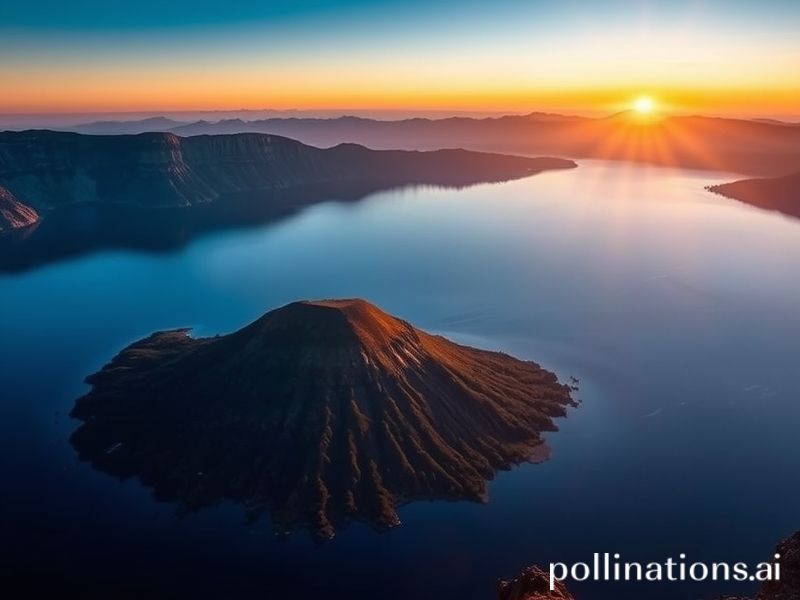Oregon: The World’s Politest Apocalypse—A Global Field Report
PORTLAND—Somewhere between the artisanal kombucha taprooms and the climate-controlled grow-ops that now outnumber Starbucks, Oregon has quietly become the world’s most polite apocalypse. From an international vantage point, the Beaver State is less a geographic oddity and more a pilot program for how the rest of the planet might cope when the bill for two centuries of industrial exuberance finally arrives—wrapped, naturally, in recycled hemp twine.
To the European eye, Oregon looks like Denmark after a three-day ayahuasca retreat: still bicycle-obsessed, still smug about its carbon footprint, but now convinced the moss on its public buildings is a form of civic acupuncture. To the average Singaporean bureaucrat, the state’s legalization of psilocybin therapy is either visionary harm reduction or the legislative equivalent of handing out sparklers in a fireworks factory—opinions vary depending on blood-alcohol content at the last F1 after-party.
Yet the international significance is hard to ignore. Oregon’s 2020 Drug Decriminalization Act—Measure 110—was watched by everyone from Lisbon policy wonks to Bangkok narcotics cops as a real-time stress test of what happens when you treat addiction like a public-health hangover instead of a moral failing. Early returns: overdoses up, treatment beds full, and a thriving black-market in “recovery coaches” who accept payment in untraceable crypto or vintage vinyl. In other words, a perfect mirror of global ambivalence toward anything that can’t be optimized by an app.
Meanwhile, the state’s forests—once merely scenic—have become the planet’s unsolicited carbon-offset ATM. California hedge funds, German pension managers, and even the odd Saudi sovereign wealth fund now stuff old-growth tracts into their ESG portfolios like guilty billionaires tucking organic kale into a Big Mac. The trees, for their part, continue to burn with the punctuality of a Swiss train each August, reminding investors that nature still accepts cash but prefers payment in fire.
Water, that quaint 20th-century luxury, is the new geopolitical drama. Oregon’s Klamath Basin has turned into a slow-motion border dispute between farmers, indigenous tribes, and migrating salmon—none of whom have read the same UN climate report, but all of whom have lawyered up accordingly. The rest of the world watches, popcorn in hand, as the state attempts to negotiate a cease-fire between species using Zoom breakout rooms and a shared Google Doc titled “Who Gets the Last Drop.” Spoiler: Google’s servers are in drought-stricken The Dalles, so the Doc keeps crashing.
Then there’s Portland itself: the city that weaponized brunch. Internationally, it serves as both cautionary tale and aspirational screensaver. Japanese urban planners study its 15-minute-city experiments; Brazilian graffiti crews pilgrimage here to tag federally owned courthouses now protected by plywood that costs more per square foot than Ipanema real estate. The city’s nightly protest choreography—equal parts performance art, civil-rights seminar, and live-action role play—has been livestreamed into dorm rooms from Lagos to Lahore, providing a generation with the comforting illusion that revolution can be crowd-funded via Venmo.
Of course, no mention of Oregon would be complete without its most successful export: passive-aggressive enlightenment. The state has franchised its particular brand of guilt-laden sustainability—organic cotton totes that whisper “you’re still part of the problem”—to upscale enclaves from Notting Hill to Nørrebro. The result is a global underclass of baristas who can lecture you on single-origin beans while secretly fantasizing about a coal-rolling F-250.
So what does Oregon portend for a planet lurching from crisis to crisis? Perhaps nothing more than the realization that even the most progressive corners of the developed world are merely arranging deck chairs on the Titanic—except these chairs are crafted from reclaimed barn wood and priced at $1,200 on Etsy. The ship’s still sinking, but at least the soundtrack is a curated vinyl reissue of whale songs remastered at 45 RPM for extra melancholy.
In the end, Oregon is less a state than a mood: equal parts hope and hangover, a place where you can legally microdose existential dread while composting your anxiety. The rest of us should probably pay attention; the experiment is messy, occasionally ridiculous, but still preferable to the authoritarian backslide on offer elsewhere. If this is the rehearsal for civilization’s next act, let’s hope the lighting cues improve—and that the planet has better fire insurance.







